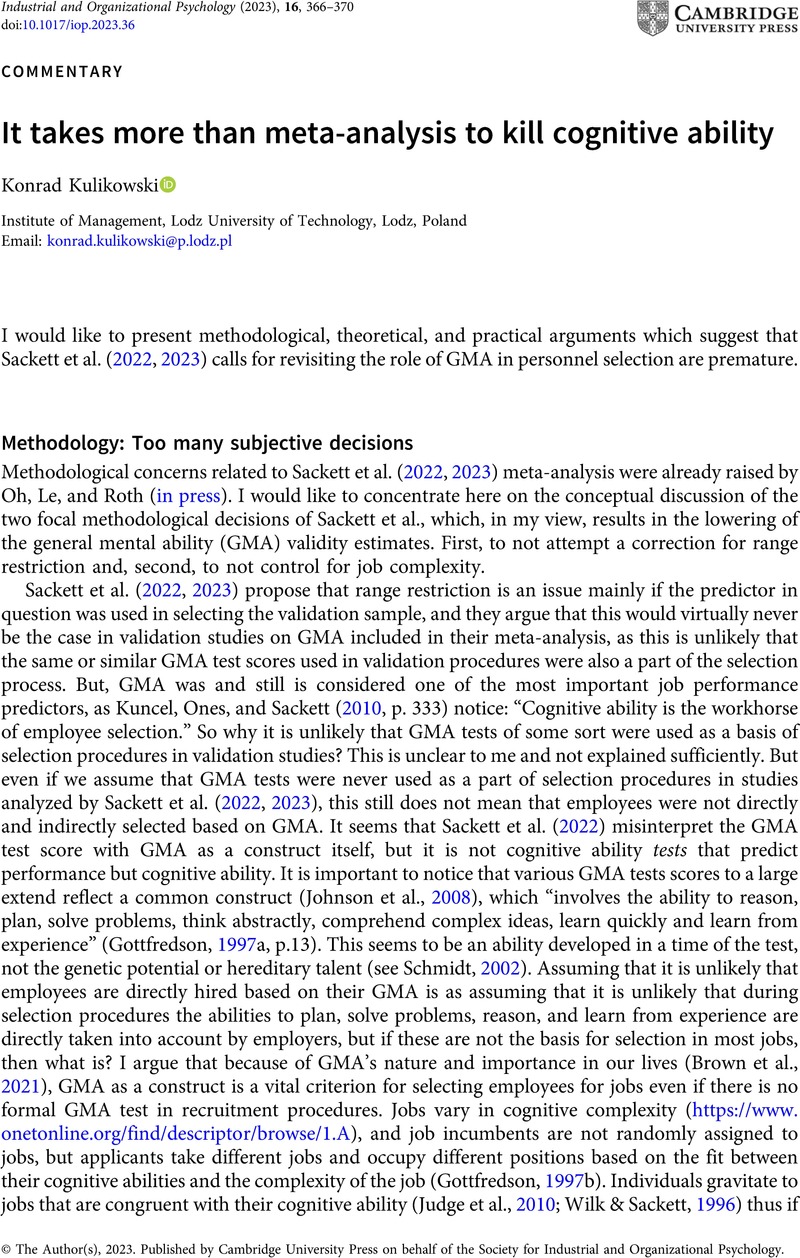No CrossRef data available.
Article contents
It takes more than meta-analysis to kill cognitive ability
Published online by Cambridge University Press: 31 August 2023
Abstract
An abstract is not available for this content so a preview has been provided. Please use the Get access link above for information on how to access this content.

- Type
- Commentaries
- Information
- Copyright
- © The Author(s), 2023. Published by Cambridge University Press on behalf of the Society for Industrial and Organizational Psychology
References
Berry, C. M., Gruys, M. L., & Sackett, P. R. (2006). Educational attainment as a proxy for cognitive ability in selection: Effects on levels of cognitive ability and adverse impact. Journal of Applied Psychology, 91(3), 696–705. https://doi.org/10.1037/0021-9010.91.3.696
CrossRefGoogle ScholarPubMed
Brown, M. I., Wai, J., & Chabris, C. F. (2021). Can you ever be too smart for your own good? Comparing linear and nonlinear effects of cognitive ability on life outcomes. Perspectives on Psychological Science, 16(6), 1337–1359. https://doi.org/10.1177/1745691620964122
CrossRefGoogle ScholarPubMed
Freund, P. A., & Kasten, N. (2012). How smart do you think you are? A meta-analysis on the validity of self-estimates of cognitive ability. Psychological Bulletin, 138(2), 296–321. https://doi.org/10.1037/a0026556
CrossRefGoogle Scholar
Gottfredson, L. S. (1997a). Mainstream science on intelligence: An editorial with 52 signatories, history, and bibliography. Intelligence, 24(1), 13–23. https://doi.org/10.1016/S0160-2896(97)90011-8
CrossRefGoogle Scholar
Gottfredson, L. S. (1997b). Why g matters: The complexity of everyday life. Intelligence, 24(1), 79–132.CrossRefGoogle Scholar
Gottfredson, L. S. (2002). Where and why g matters: Not a mystery. Human Performance, 15(1-2), 25–46. https://doi.org/10.1016/S0160-2896(97)90014-3
Google Scholar
Huffcutt, A. I., Culbertson, S. S., & Weyhrauch, W. S. (2014). Moving forward indirectly: Reanalyzing the validity of employment interviews with indirect range restriction methodology. International Journal of Selection and Assessment, 22(3), 297–309. https://doi.org/10.1111/ijsa.12078
CrossRefGoogle Scholar
Johnson, W., te Nijenhuis, J., & Bouchard, T. J. Jr (2008). Still just 1 g: Consistent results from five test batteries. Intelligence, 36(1), 81–95. https://doi.org/10.1016/j.intell.2007.06.001
CrossRefGoogle Scholar
Joseph, D. L., & Newman, D. A. (2010). Emotional intelligence: An integrative meta-analysis and cascading model. Journal of Applied Psychology, 95(1), 54–78. https://doi.org/10.1037/a0017286
CrossRefGoogle ScholarPubMed
Judge, T. A., Klinger, R. L., & Simon, L. S. (2010). Time is on my side: Time, general mental ability, human capital, and extrinsic career success. Journal of Applied Psychology, 95(1), 92–107. https://doi.org/10.1037/a0017594
CrossRefGoogle ScholarPubMed
Kuncel, N. R., Ones, D. S., & Sackett, P. R. (2010). Individual differences as predictors of work, educational, and broad life outcomes. Personality and Individual Differences, 49(4), 331–336. https://doi.org/10.1016/j.paid.2010.03.042
CrossRefGoogle Scholar
Lubinski, D. (2004). Introduction to the special section on cognitive abilities: 100 years after Spearman’s (1904) "General intelligence,' objectively determined and measured". Journal of Personality and Social Psychology, 86(1), 96–111. https://doi.org/10.1037/0022-3514.86.1.96
CrossRefGoogle Scholar
Oh, I., Le, H., & Roth, P. L (in press). Revisiting Sackett et al.’s (2022) recommendation against correcting for range restriction in concurrent validation studies. Journal of Applied Psychology. https://doi.org/10.2139/ssrn.4308528
Google Scholar
Oh, I. S. (2022). Perfect is the enemy of good enough: Putting the side effects of intelligence testing in perspective. Industrial and Organizational Psychology, 15(1), 130–134. https://doi.org/10.1017/iop.2021.126
CrossRefGoogle Scholar
Ritchie, S. J., & Tucker-Drob, E. M. (2018). How much does education improve intelligence? A meta-analysis. Psychological Science, 29(8), 1358–1369. https://doi.org/10.1177/0956797618774253
CrossRefGoogle ScholarPubMed
Roth, P. L., & Huffcutt, A. I. (2013). A meta-analysis of interviews and cognitive ability. Journal of Personnel Psychology, 2(4), 157–169. https://doi.org/10.1027/1866-5888/a000091
CrossRefGoogle Scholar
Sackett, P. R., Borneman, M. J., & Connelly, B. S. (2008). High stakes testing in higher education and employment: Appraising the evidence for validity and fairness. American Psychologist, 63(4), 215–227. https://doi.org/10.1037/0003-066X.63.4.215
CrossRefGoogle ScholarPubMed
Sackett, P. R., Zhang, C., & Berry, C. M. (2023). Challenging conclusions about predictive bias against Hispanic test takers in personnel selection. Journal of Applied Psychology, 108(2), 341–349. https://doi.org/10.1037/apl0000978
CrossRefGoogle ScholarPubMed
Sackett, P. R., Zhang, C., Berry, C. M., & Lievens, F. (2022). Revisiting meta-analytic estimates of validity in personnel selection: Addressing systematic overcorrection for restriction of range. Journal of Applied Psychology, 107
(11), 2040–2068. Retrieved from https://ink.library.smu.edu.sg/lkcsb_research/6894
CrossRefGoogle ScholarPubMed
Sackett, P. R., Zhang, C., Berry, C. M., & Lievens, F. (2023). Revisiting the design of selection systems in light of new findings regarding the validity of widely used predictors. Industrial and Organizational Psychology: Perspectives on Science and Practice, 16(3), 283–300. https://doi.org/10.1017/iop.2023.24
CrossRefGoogle Scholar
Schmidt, F. L. (2002). The role of general cognitive ability and job performance: Why there cannot be a debate. Human Performance, 15(1-2), 187–211. https://doi.org/10.1207/S15327043HUP1501&02_12
CrossRefGoogle Scholar
Schmidt, F. L., & Hunter, J. (2004). General mental ability in the world of work: occupational attainment and job performance. Journal of Personality and Social Psychology, 86(1), 162–173. https://doi.org/10.1037/0022-3514.86.1.162
CrossRefGoogle ScholarPubMed
Schmidt, F. L., & Hunter, J. E. (1998). The validity and utility of selection methods in personnel psychology: Practical and theoretical implications of 85 years of research findings. Psychological Bulletin, 124(2), 262–274. https://doi.org/10.1037/0033-2909.124.2.262
CrossRefGoogle Scholar
Vrieze, J. (2018, September 18). Meta-analyses were supposed to end scientific debates. Often, they only cause more controversy. Science. https://doi.org/10.1126/science.aav4617
CrossRefGoogle Scholar
Wilk, S. L., & Sackett, P. R. (1996). Longitudinal analysis of ability–job complexity fit and job change. Personnel Psychology, 49(4), 937–967. https://doi.org/10.1111/j.1744-6570.1996.tb02455.x
CrossRefGoogle Scholar




